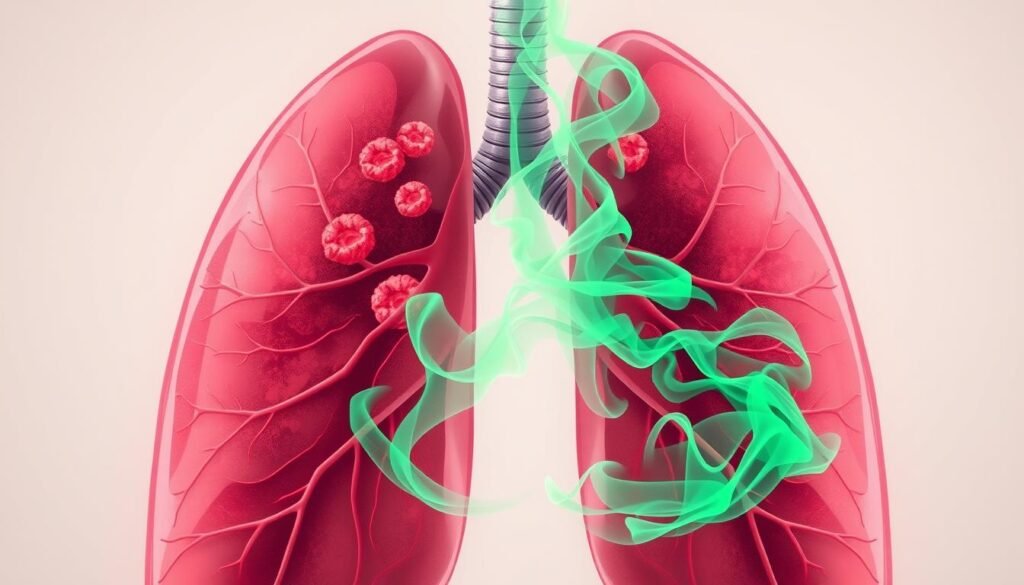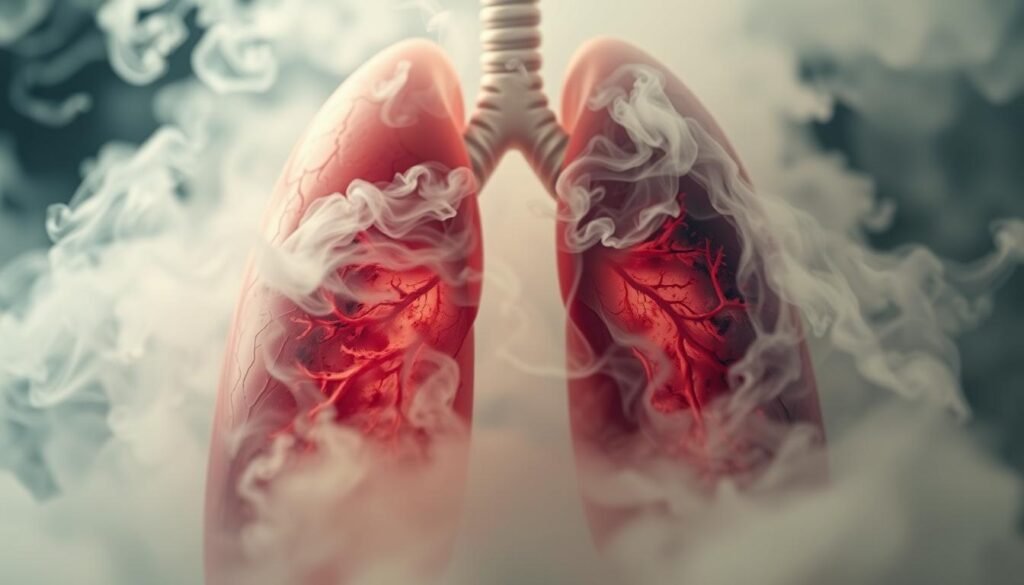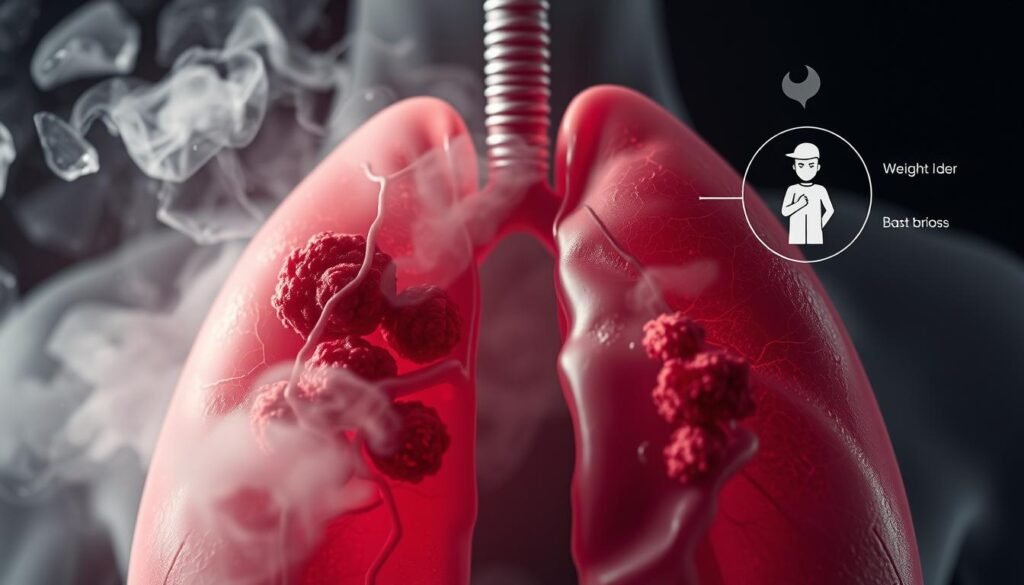About 15% of people with lung cancer notice their breath smells different. It might smell musty, sweet, or like rotting fruit. This shows there’s a strong link between lung cancer symptoms and how your breath smells. Bad breath, or halitosis, can be a sign of serious health problems. It might suggest lung cancer. This piece explores how lung cancer might change your breath smell and what signs to look for. Researchers are learning that analyzing breath could help find cancer early. Although not all with lung cancer get bad breath, there’s enough evidence to pay attention.
Key Takeaways
- Changes in breath odor can be indicative of serious health issues.
- Common breath smells in lung cancer patients include musty and sweet scents.
- Persistent halitosis should prompt a consultation with a healthcare provider.
- Smoking can exacerbate bad breath and may be linked to lung cancer.
- Researchers utilize breath analysis technologies for potential early cancer detection.
Understanding Halitosis: The Basics
Halitosis, or bad breath, is a common problem that affects half of the US. It mainly comes from bad oral hygiene. When we don’t clean our mouths well, bacteria build up. They produce smelly compounds, causing halitosis.
What causes bad breath? Here are some common reasons:
- Gum disease: Plaque buildup can lead to gum disease and worsen breath.
- Dry mouth: Smoking or some meds can make your mouth dry, which worsens breath.
- Sinus and throat infections: These can lead to postnasal drip, which often causes bad breath.
- Diabetes: In severe cases, it can make your breath smell sweet and fruity.
- Cancers of the head and neck: These cancers often cause ongoing bad breath.
- Gastroesophageal reflux disease (GERD): This condition makes your breath smell sour from stomach acids.
- Liver and kidney diseases: When these organs don’t work well, your breath might smell bad.
- Tonsil stones: Food particles that harden in your tonsils can cause a foul smell.
- Seasonal allergies and gastrointestinal issues: Both can lead to bad breath in different ways.
Most bad breath, around 90%, comes from problems in the mouth. Going to the dentist regularly helps find and fix these issues. It also helps keep your mouth healthy.
| Cause | Details |
|---|---|
| Gum Disease | Build-up of plaque can lead to halitosis and requires dental intervention. |
| Dry Mouth | Lack of saliva increases bacteria, leading to bad breath. |
| Infections | Throat and sinus infections can contribute to halitosis via postnasal drip. |
| Diabetes | Can create a sweet, fruity odor in advanced conditions. |
| Cancers | Oral and throat cancers are often associated with persistent bad breath. |
| GERD | Acid reflux can result in sour breath. |
| Liver and Kidney Diseases | Impaired function may lead to toxin accumulation and bad breath. |
| Tonsil Stones | Formed from food particles, leading to a foul odor. |
| Allergies | Seasonal allergies can exacerbate bad breath symptoms. |
The Connection Between Lung Cancer and Bad Breath
Lung cancer can show itself in surprising ways, like bad breath. The cancer doesn’t cause bad breath directly. But, conditions linked to it do. For instance, lung cancer can change how our bodies work. This may mess up the balance of mouth bacteria, leading to bad breath.
Treatments for lung cancer can also make the immune system weaker. This makes it easier to get infections in the mouth, which can cause bad breath. Chemotherapy can dry out the mouth, leading to more bacteria. Less saliva means more bacteria and difficulty with eating.

Bad breath is a common problem, affecting about one in four people. For those with lung cancer, managing oral health is very important. Bad breath can be a sign that doctors need to check the patient’s health more closely. Regular dentist visits and good mouth care can help. They are especially helpful for people getting palliative care.
| Condition | Impact on Bad Breath |
|---|---|
| Chronic Dry Mouth | Decreases saliva, leading to bacteria overgrowth. |
| Weakened Immune System | Increases risk of oral infections. |
| Chemotherapy | Can cause dry mouth and changes in taste, affecting breath odor. |
| Metabolic Changes | Alters the microbiome balance in the mouth. |
Knowing how lung cancer and bad breath are connected is crucial. It helps in managing both the disease and its side effects. This knowledge lets patients and caregivers focus on oral health as a key part of care.
Can Lung Cancer Cause Bad Breath? Insights and Symptoms
Lung cancer can lead to changes in breath. It’s important to know why this happens. Volatile organic compounds (VOCs) play a big role in this.
Exploring VOCs in Lung Cancer Breath
Volatile organic compounds give clues about lung cancer. People with lung cancer exhale different VOCs than healthy folks. These changes might help spot the disease early.
Specific VOCs become markers of lung cancer. Studying these can point out underlying health issues. It’s key to keep an eye on breath changes.
Identifying Characteristic Breath Odors in Lung Cancer Patients
Lung cancer can cause unique breath smells. These might be musty, sweet, or like something rotting. These smells come from the disease’s biochemical activities.
Knowing these odor changes is important. It can help catch lung cancer early. If you notice these, it could be time to see a doctor.

Common Symptoms of Lung Cancer
Lung cancer is the top cause of cancer deaths worldwide. It’s essential to know the lung cancer signs early. Symptoms usually show up late, making it harder to treat. A long-lasting cough, over eight weeks, could be an early sign. People might also notice coughing up blood, chest pain, or losing weight without trying.
As the disease gets worse, you might feel short of breath because the airways are blocked. Many feel very tired and get sick a lot, like with bronchitis or pneumonia. If your voice gets hoarse, it could mean the tumor is affecting your vocal cords. Catching these signs early can make a big difference in treatment.
When lung cancer gets really severe, it can spread to the brain and bones. This causes more symptoms like bone pain or headaches and weakness. There are also specific conditions, like Horner syndrome, linked to lung cancer. They have their own symptoms and need quick check-ups with a doctor.
To learn more about signs and treatment side effects, go to this informative resource. Understanding these signs helps catch lung cancer early. This is crucial, especially for those at high risk.

Other Causes of Bad Breath
Bad breath, or halitosis, signals deeper problems. Lung cancer might impact breath smell, but other issues matter too. Learning about different causes of bad breath is key for good oral health and happiness.
Dental and Oral Health Issues
Poor oral hygiene is a big reason for halitosis. Studies find that not taking care of your mouth leads to most bad breath. Bacteria love leftover food and plaque, creating a stinky smell. Clean your teeth well, especially the hidden spots, to fight bad breath.
Dietary Influences on Breath Odor
What you eat can change how your breath smells. Foods like garlic, onions, and spices make breath smell different. Sugary foods cause plaque, and plaque smells bad. Coffee and alcohol lower saliva, helping bacteria grow. High-protein or low-carb diets might also cause halitosis. Good eating habits and drinking lots of water help keep breath fresh.
Look at how your diet affects your breath on oral hygiene and cancer treatment.
Medical Conditions Associated with Halitosis
Halitosis is linked to many health issues. Diabetes can mess with your sugar levels, causing gum disease and bad breath. Digestive problems like acid reflux add to the trouble. Dry mouth, triggered by some medicines, also leads to halitosis. Sinus infections and breathing issues add to the problem with extra mucus and bacteria. Good dental care helps manage these health-related breath issues.
Smoking and Its Impact on Breath
Smoking greatly affects how your breath smells. It makes your mouth dry. This dryness throws off the balance of bacteria in your mouth, causing bad breath. Smoking also changes how things taste, making it hard to notice the bad smell of your breath.
Since 1964, over 20 million people have died from smoking-linked diseases. This shows the huge effect smoking has on health. 80% of people with oral cancer say it’s because of using tobacco. Smoking not just risks your health but it also changes how your breath smells.
If you smoke, you might notice your breath often smells bad. This is because smoking is a major reason for ongoing bad breath. The good news is, quitting can help your breath smell better and boost your health. There are many resources available to help quit smoking.
Smoking and lung cancer are closely connected. Cigarette smoke harms the cilia in your airways, which should clean out mucus and debris. Harm to cilia can lead to chronic bronchitis and emphysema, conditions linked with long-term smoking. Other than making breath smell bad, these conditions worsen health.
Stopping smoking can improve both your dental health and your general well-being. Getting rid of tobacco greatly benefits your health. This step is crucial for anyone caring about their health.
Importance of Oral Hygiene for Cancer Patients
For those undergoing cancer treatment, keeping up with oral hygiene is key. Therapies like chemotherapy can cause complications such as mouth ulcers and infections. These issues can lead to bad breath and impact overall health. Good oral care helps prevent these problems and improves quality of life.
Maintaining Oral Health During Treatment
It’s important for cancer patients to look after their oral health. Treatments may cause dry mouth, known as xerostomia. Drinking plenty of water helps with this. Also, seeing a dentist regularly is crucial to avoid infections. Side effects from chemotherapy usually start 5 to 10 days after treatment begins. Knowing what to expect can help patients take care of their mouths better.
For more details on these challenges, check here.
Tips for Improved Oral Hygiene
Here are some tips to boost oral hygiene for cancer patients:
- Brush teeth gently with fluoride toothpaste two to three times a day.
- Use a soft-bristled toothbrush to avoid irritating sensitive areas.
- Choose alcohol-free mouthwash to prevent dryness and irritation.
- Floss daily to get rid of plaque and prevent tooth decay.
- Always talk to doctors about oral health problems to avoid complications.
Taking care of oral hygiene is crucial for cancer patients. It helps reduce treatment side effects and helps in the fight against lung cancer signs. A focus on oral care keeps patients healthier during their treatment.
Scientific Advances: Breath Analysis for Early Detection
Recent progress in breath analysis has changed how we detect lung cancer early. This method checks the volatile organic compounds (VOCs) in the breath. These can indicate diseases, including cancer. Researchers have found about 200 VOCs in healthy people. As we learn more about these compounds, detecting lung cancer early may become easier.
Electronic Nose Technology in Cancer Diagnosis
Electronic nose technology is key in diagnosing cancer. It works like human smell to identify different VOCs linked to health issues. Studies show significant differences in the breath of healthy people and those with lung cancer. For example, research found 4,412 unique VOCs in breath and other fluids. These findings highlight how breath analysis is getting better at spotting cancer.
The Future of Breath Tests in Oncology
The outlook for breath tests in oncology is promising with ongoing research. Scientists are looking at how electronic noses can spot different cancers, not only lung cancer. More and more, signs show that certain breath compounds point to cancer. Breath analysis might soon be part of regular check-ups. This could lead to quicker treatment, helping patients live longer.
Conclusion
Exploring lung cancer’s link to bad breath shows a complex connection. Lung cancer might not cause bad breath directly. However, related issues like weakened immunity and dry mouth from treatments play a big role.
Detecting lung cancer has seen promising advancements. Technologies like Electronic Nose Technology and Gas Chromatography-Mass Spectrometry are changing how we diagnose cancer. They detect specific compounds in breath, improving early diagnosis and our understanding of lung cancer.
Managing bad breath for lung cancer patients requires a well-rounded approach. Good oral care, diet changes, and handling health problems are key. Improved approaches can lead to better health outcomes. Growing knowledge opens the door to enhanced care for lung cancer and related issues.